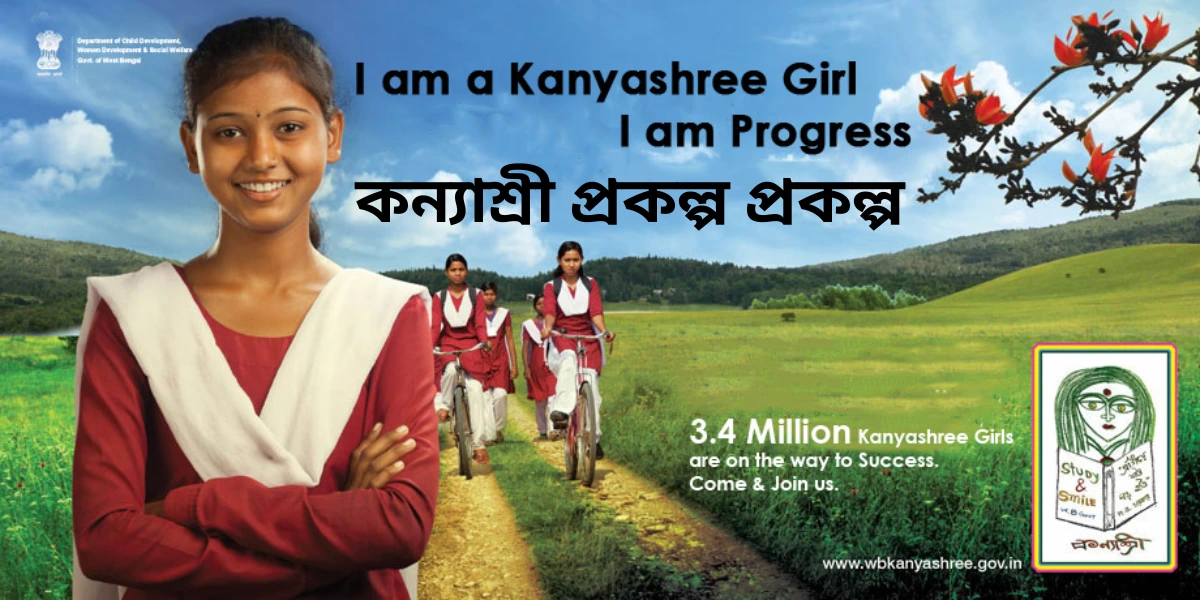The Kanyashree Prakalpa Scheme is a flagship initiative of the Government of West Bengal aimed at improving the status and well-being of adolescent girls. Launched in 2013 by then Chief Minister Mamata Banerjee, the scheme focuses on reducing child marriage, encouraging education, and empowering girls from economically disadvantaged families. Recognized internationally by the United Nations and awarded the UN Public Service Award in 2017, Kanyashree has transformed millions of young lives in Bengal.
Objectives of Kanyashree Prakalpa – কন্যাশ্রী প্রকল্প প্রকল্প
The scheme was designed with the following core objectives:
- Preventing Child Marriage: By incentivizing families to delay the marriage of girls until they reach adulthood.
- Promoting Education: Ensuring that girls continue their studies at least up to higher secondary level.
- Financial Empowerment: Providing direct financial support to adolescent girls from weaker sections.
- Gender Equality: Reducing gender discrimination and empowering young women to become self-reliant.
Read Also : WB Duare Sarkar Camp List 2025 Kolkata
Key Components of the Scheme
Kanyashree Prakalpa has three major components:
1. K1 – Annual Scholarship
- For girls aged 13–18 years.
- Must be enrolled in class VIII to class XII in government-recognized schools/madrasahs/vocational or technical training centers.
- Family income should not exceed ₹1,20,000 annually (exceptions for orphans/disabled).
- Scholarship amount: ₹750 per year.
2. K2 – One-Time Grant
- For girls turning 18 years of age.
- Must remain unmarried until the age of 18 and continue education or vocational training.
- One-time financial grant: ₹25,000.
3. K3 – Kanyashree Plus
- For girls pursuing higher studies (university level).
- Provides support through skill development and career counseling.
Eligibility Criteria
To avail the scheme, applicants must meet the following conditions:
- Resident of West Bengal.
- Girl student aged 13 to 19 years.
- Must be unmarried at the time of application.
- Belongs to a family with annual income ≤ ₹1,20,000.
- Enrolled in a recognized educational institution.
- Special provisions: Orphans, girls with special needs, and girls in child care homes are eligible regardless of family income.
Documents Required
Applicants must submit:
- Birth certificate
- Proof of residence (Aadhaar, voter ID, ration card, etc.)
- Income certificate
- School certificate/ID
- Unmarried declaration form
- Bank account details (must be in the applicant’s name)
- Passport-sized photographs
Application Process
- Collect the application form from school or download it from the official portal.
- Fill in the required details carefully.
- Attach supporting documents.
- Submit the form to the school head/principal.
- School authority verifies and forwards to Block/Municipality level officers.
- After approval, funds are transferred directly to the beneficiary’s bank account via DBT (Direct Benefit Transfer).
Benefits of Kanyashree Prakalpa
- Financial Assistance to continue education without burdening poor families.
- Encourages Higher Education among girls.
- Prevents Early Marriage by incentivizing families to keep girls in school.
- Skill Development through Kanyashree Plus, preparing them for employment.
- Empowerment & Confidence – girls become more self-reliant.
- Recognition – Beneficiaries receive an official ID card and digital record.
Impact of the Scheme
- Over 60 lakh girls have benefited since its launch.
- Dropout rates among adolescent girls have significantly reduced.
- Early marriages have decreased in several districts of West Bengal.
- The scheme has received global appreciation, including the UNICEF & UNFPA recognition.
- Inspired other states in India to implement similar girl-child welfare programs.
Popular FAQs for Kanyashree Prakalpa Scheme
A: Girls between 13 and 19 years are eligible under K1, while K2 benefits apply at 18 years.
A: No, applicants must remain unmarried to receive benefits.
A: Yes, beneficiaries can check status and apply through the official Kanyashree portal.
A: Funds are directly transferred to the beneficiary’s bank account via DBT.
